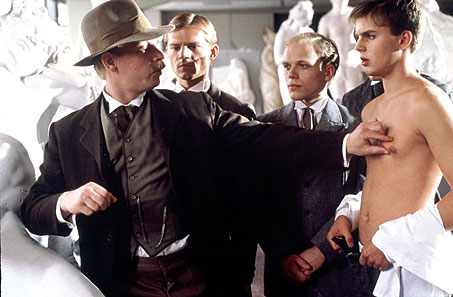
 |
||||||
|
GAY
FILM REVIEWS BY MICHAEL D. KLEMM
|
||||||
|
The Einstein of Sex TLA Releasing, 1999) Director: Screenplay: Chris Klaus and Valentin Passoni Starring: Friedel Von Waggenheim, Ben Becker, Wolfgang Volz, Otto Sander, Merit Becker Unrated, 98 minutes
|
Stonewall
on the Rhine
The pioneering sexual research of one of the gay community's first champions, Dr. Magnus Hirschfeld, (1868-1935), was destroyed during the Nazi regime. The Einstein of Sex, a biography of this pre-Stonewall hero, directed by the legendary Rosa Von Praunheim, is now available on home video.
Predictably, his published views become suspect and are attacked. By the 1920s, however, a freer climate allows Hirschfeld to open the Institute of Sexology in Berlin. But newfound freedoms are swept away when the Nazis seize power. While Hirschfeld was abroad lecturing, his Institute was looted by brownshirts and his research ceremoniously burned. Hirschfeld dared not return to Germany and he died in exile in 1935. Ironically, despite his research, Hirschfeld remained celibate in order to avoid scandal. It was only in his later years that he allowed himself sexual companionship. Von Praunheim's film takes an episodic approach, mixing landmark events with key moments from Hirschfeld's private life. |
 |
|
|
The Einstein of Sex is shot on digital video and feels like a BBC production. But, believe me, you have never seen anything quite like this on Masterpiece Theatre. As history, this is one outrageous lecture, as if delivered at times by Monty Python. There is frequent full frontal male nudity, and the director delights in showing the bizarre sexual artifacts from various cultures that Hirschfeld collects. (Picture, if you will, a dildo carved from an elephant's tusk.) Those unfamiliar with Von Praunheim's oeuvre might recognize the shock tactics employed in early John Waters films, but coupled with the politics of an angry Larry Kramer. That Von Praunheim would choose to film the life of Hirschfeld is not surprising. Like his fellow countryman, Rainer Werner Fassbinder, Von Praunheim made a name for himself in the 1970s with cinema that explicitly dealt with homosexuality when it was still a taboo subject. But, while Fassbinder was more concerned with melodrama, Von Praunheim's forte was radical politics and agitprop. Many of his films, like his 1971 It Is Not The Homosexual Who Is Perverse, But The Situation In Which He Lives, shocked and offended even his gay audience. When he skewered AIDS in his black comedy, A Virus Knows No Morals, promiscuity was targeted along with the indifference of the Right Wing. In The Einstein of Sex, he isn't afraid to tackle modern debates and place them in a historical setting. We learn that the practice of "outing" is nothing new. Hirschfeld's rival, a publisher of gay erotica named Adolph Brand, belittles Hirschfeld's attempts to repeal Paragraph 175 and suggests instead that they reveal to the press that a prominent Chancellor likes to entertain rent boys at his villa. Brand also hosts a group of "manly" men who perform nude gymnastics in the forest, and he berates Hirschfeld for championing the "queeny sissy boys" who are an affront to his "masculine" views. This might remind contemporary viewers of clashes between gay Republicans, who wish Pride Parades would be more toned down, and criticize men like Jack on Will and Grace who like to be as "in-your-face" as possible.
The Einstein of Sex excels when thumbing its nose at societal norms, but falters when depicting violence. The destruction of Hirschfeld's clinic by the Nazis (all five of them) is clumsily filmed, but then if I wanted choreographed action I would have watched The Matrix. Yes, it lacks the glitz of a Hollywood film, but it would make a great triple bill with the documentary Paragraph 175 and Bob Fosse's Cabaret to give a complete portrait of gay Germany in the early 20th century. It is also a badly needed history lesson. If certain modern religious and conservative groups had their way, we would all be back hiding in the closet again. The DVD is in German with English subtitles and contains a terrific documentary and interview with Von Praunheim. Netflix.com rents this film if none of the video stores in town stock it.
More On Rosa Von
Praunheim Also of interest: The first gay positive film ever made |